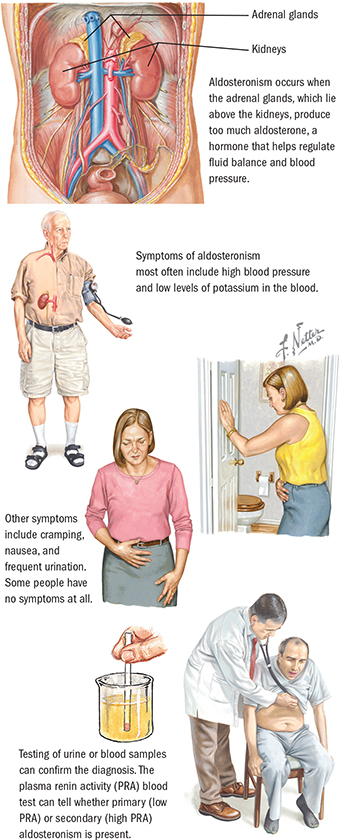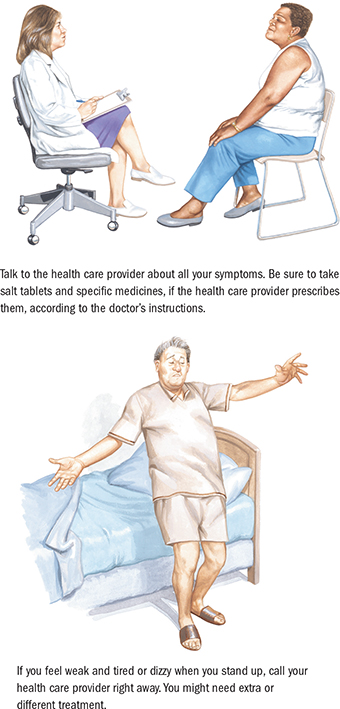
Aldosteronism is an illness caused by too much aldosterone, a hormone produced by adrenal glands. These two small glands sit atop the kidneys. Aldosteronism leads to high blood pressure and low blood potassium levels.
Aldosterone is a hormone that regulates blood pressure and body fluids by increasing sodium and fluid levels in the blood and increasing removal of potassium by kidneys. The two main types of aldosteronism are primary and secondary. Primary aldosteronism means that extra aldosterone comes from adrenal glands themselves, usually because of a growth (or tumor). This usually benign (not cancerous) tumor is called an adenoma. This disorder is also called Conn’s syndrome. Bilateral adrenal hyperplasia, an illness in which both glands are enlarged and overproduce aldosterone, may also cause this condition.
Secondary aldosteronism means that the illness results from other conditions, such as congestive heart failure, liver failure, kidney disease, and dehydration, or certain medicines, such as diuretics or fludrocortisone.
Aldosteronism accounts for less than 1% of cases of high blood pressure in the United States.
High blood pressure, weakness, cramping, nausea, constipation, muscle spasm, and frequent urination may occur. Some people have no symptoms.
High blood pressure and low blood potassium levels may indicate aldosteronism.
High aldosterone levels can be measured in blood or urine. A special blood test called plasma renin activity (PRA) can help determine whether primary or secondary aldosteronism is present. A specialist called an endocrinologist will use special tests for primary aldosteronism. Endocrinologists treat diseases of glands and hormones.
An MRI (magnetic resonance imaging) or CT (computed tomography) scan of the belly (abdomen) may be done to help identify the cause of aldosteronism.

Untreated aldosteronism can cause uncontrolled high blood pressure, which can be a risk factor for stroke or heart disease. People with very low potassium levels may also have an abnormal heartbeat. Treatment for Conn’s syndrome involves tumor removal by surgery.
Bilateral adrenal hyperplasia can’t be cured unless both adrenal glands are removed. This removal may cause more side effects than wanted. Therefore people with this illness take spironolactone, a diuretic. This drug helps keep blood potassium levels normal. Side effects may include gynecomastia (breast development in men), impotence, and feeling tired and drowsy.
For aldosteronism resulting from other illnesses, treatment of the condition causing higher aldosterone levels will help.
Contact the following sources:
Copyright © 2016 by Saunders, an imprint of Elsevier, Inc.
Ferri’s Netter Patient Advisor